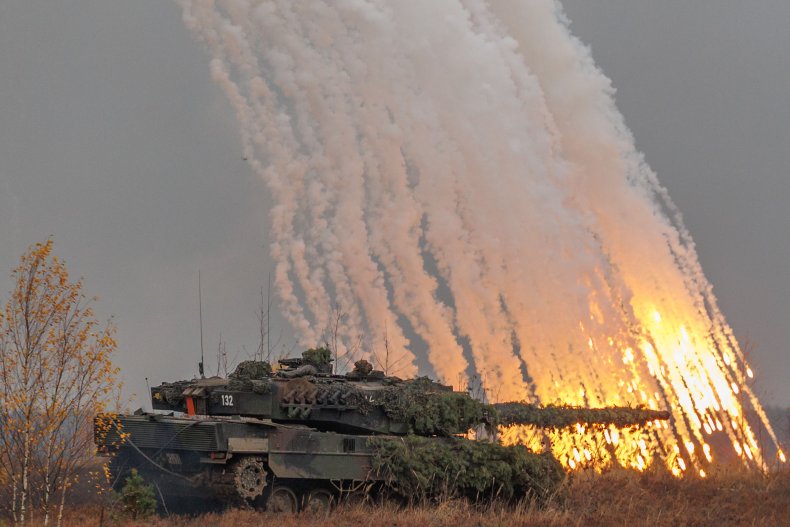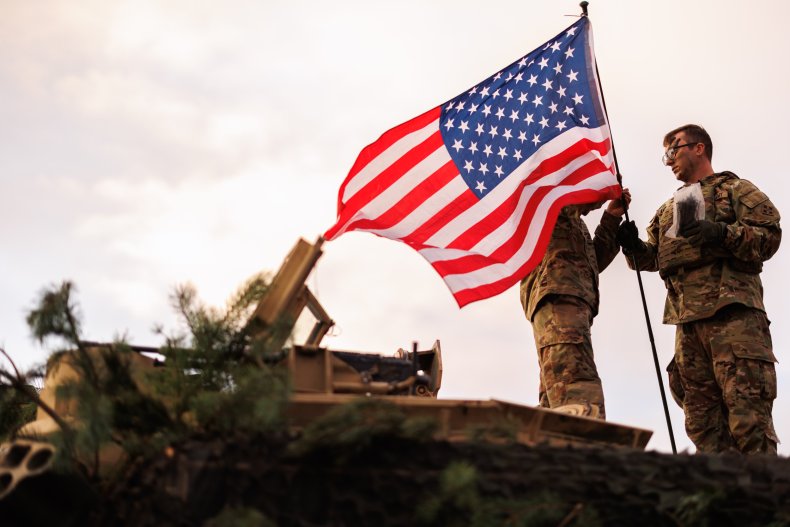DAVID BRENNAN
Fifty-nine percent of respondents to a Newsweek poll said Europeans need to take more responsibility for the continent's security.
Russia's full-scale invasion of Ukraine has renewed focus on Europe's military capabilities.
Given the dual challenges of Russia and China, American policymakers have long been pushing European allies to take on more responsibility for defense.
Americans want their European allies to be less reliant on U.S. military might to defend the continent, a Newsweek poll has found, as policymakers juggle the dual challenges of a revanchist Russia and an increasingly assertive China.
The survey of 1,500 eligible U.S. voters—which was conducted on April 4 by Redfield & Wilton Strategies on behalf of Newsweek—found broad American support for NATO and Ukraine, but suggested that voters want to see their European allies pivot towards greater military self-reliance.
A majority of respondents either strongly agreed (27 percent) or agreed (32 percent) that Europe was too dependent on the U.S. for defense. A quarter neither agreed nor disagreed, and only 8 percent disagreed (6 percent) or strongly disagreed (2 percent).
Those surveyed largely believe that the defense of Europe is important for American security. A majority either strongly agreed (33 percent) or agreed (33 percent) that European security is "vital" to the U.S. national interest. Nineteen percent neither agreed nor disagreed, with only 6 percent disagreeing (4 percent) or strongly disagreeing (2 percent). Almost 10 percent said they did not know.
 A German-made Leopard 2 tank is pictured during NATO Iron Wolf drills on October 26, 2022 in Fabradé, Lithuania.OLIVIER MATTHYS/GETTY IMAGES
A German-made Leopard 2 tank is pictured during NATO Iron Wolf drills on October 26, 2022 in Fabradé, Lithuania.OLIVIER MATTHYS/GETTY IMAGESNewsweek has contacted NATO by email to request comment.
Europe's disinclination to increase its defense spending—a bugbear for the American national security establishment—has been thrown into stark focus by Russia's full-scale invasion of Ukraine.
The combined European Union and NATO response to the February 2022 invasion has been more unified and robust than many expected, but the U.S. is still by far the biggest contributor of military aid to Kyiv.
European nations are now sending heavy weapons and large amounts of ammunition to Ukraine, but leaders have acknowledged that existing stocks and current production capabilities are limited and unable to meet the needs of an intense modern war.
Despite the return of major conflict to the continent, most European NATO members have still not reached the military spending goal of 2 percent of GDP, which was adopted in 2014.
President Emmanuel Macron is one of the most public advocates of increased European autonomy. During a visit to China earlier this week, the French leader said Europe must not become a "vassal" to the U.S. in its budding confrontation with Beijing.
Most Americans want Ukraine to join NATO
Fabrice Pothier, a former director of policy planning for NATO, told Newsweek that Macron and other advocates of European foreign policy independence want the continent to be "the third power" between China and the U.S.
"If Europe wants to be the third power, Europe needs to also face up to some of its global responsibilities and that goes beyond Europe," Pothier said. "Yes, we need to be stronger. But with strength and autonomy comes responsibility."
"There's nothing that can replace the U.S. as a global power. And if Europe wants to go up the food chain in terms of capacity, it also has to accept that it will go up in terms of responsibility."
The American frustration indicated by Newsweek's survey is not a new phenomenon. Former President Donald Trump has been perhaps the most open recent critic, reportedly even threatening to pull the U.S. out of NATO over perceived freeloading.
But policymakers from both parties have been sounding the alarm over European military spending for more than a decade.
Robert Gates, who served as defense secretary under President George W. Bush and President Barack Obama, warned in a 2011 speech: "If current trends in the decline of European defense capabilities are not halted and reversed, future U.S. political leaders—those for whom the Cold War was not the formative experience that it was for me—may not consider the return on America's investment in NATO worth the cost."
 U.S. troops are pictured with an American flag during NATO Iron Wolf drills on October 26, 2022 in Fabradé, Lithuania.OLIVIER MATTHYS/GETTY IMAGES
U.S. troops are pictured with an American flag during NATO Iron Wolf drills on October 26, 2022 in Fabradé, Lithuania.OLIVIER MATTHYS/GETTY IMAGESTrump intends to run for the White House again in 2024 and shows no sign of softening his criticism. Though leading Republican foreign policy voices have emphatically rejected the former president's apparent sympathy for the Kremlin and his skepticism about NATO, the problem of alliance "burden sharing" is not going away.
James Rogers, the co-founder and director of research at the U.K.'s Council on Geostrategy, told Newsweek: "This is coming, whether it's coming with this election or the one after, or the one after."
The long-held influence of the so-called "Atlanticists" is waning on account of increasing focus on China, according to Rogers. The rising "Pacificists" believe "Europe can tend its own garden and, even if it can't, it's supplementary to U.S. foreign policy interests," he said.
"I don't think that narrative for that discourse is going to go away," Rogers added. "It will be modified, of course, by Russia's full-scale invasion of Ukraine. But I think ultimately, so long as China continues to grow in strength, that discourse will continue to grow and become more influential."
No comments:
Post a Comment